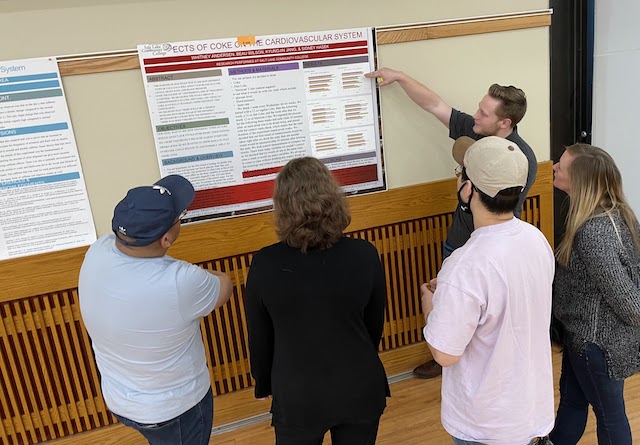 |
| Students from BIO 2425 talking to a judge about their physiology research project. |
Which Coca-Cola product is better for your cardiovascular system, regular, diet or Mexican Coke? That was one of the questions posed by students in the Human Physiology Lab (BIO 2425) whose posters were showcased for the first Physiology Symposium at the Taylorsville Redwood and Jordan campuses earlier this month.
The course is a hands-on lab where students investigate physiological processes through data and analysis of the cardiovascular, respiratory, digestive, endocrine, immune and muscular systems. Students created a plan and used the scientific method to carry out experiments. They collected and analyzed the data and created figures to explain how the data supports their hypotheses. This symposium prepared many of them to have experience in undergraduate research, even if some of the outcomes didn’t go as planned.
“Implementing a course-based undergraduate research experience increases undergraduate involvement in research and helps students achieve a deeper understanding of human physiology,” says Evelyn Mendoza Galvez, Biology Lab coordinator. “Inquiry helps the student build the understanding necessary to generate deeper learning, and there is as much value in experiences that don’t go as planned as in those that do.”
“I feel like a lot of students in college struggle with anxiety and depression. It's just interesting to find ways to bring down your anxiety so we thought this would be a cool project,” said Addison Marshall, a student who presented at the symposium.
 |
| Aikhin Cheng and Addison Marshall next to their poster. |
One of the methods her group chose was box breathing, a four-step breathing technique that involves breathing in, holding the breath, and breathing out for the same number of counts. They tested students before and after to see how the breathing affected their mental states. “This project made this class more interesting. It didn’t just feel like a science fair project that you had to do. I learned a lot as well,” she said.
This semester students were able to use new equipment to conduct their experiments such as a treadmill and lactate measuring devices that were purchased with a $68,000 award that the department received at the end of spring semester.
 |
| New equipment used in one research project. |
One group used the new treadmill to test their hypothesis and see what the effects of pre-workouts were on heart rates, and another group measured Basal Metabolic Rate (BMR) using a Total Body Composition Analyzer scale and also tested lactic acid levels using the new lactate device to see the effect that exercise has on BMR in the body.
“Our hope in creating this project-based learning opportunity was to provide students with the experience to learn physiology on a deeper level with a fun and creative approach.” Jo Stosich, biology lab instructor says she found students doing just that. “They immersed themselves in their projects and showed excitement in the process.”
All students in the class were required to do this assignment as part of their grade, however, presenting at the symposium was optional, though they had a large number of students who participated. The project spans the course of the semester and is a “rigorous” process according to Jo. But she adds that “our students stepped up to the challenge and surpassed our expectations.”
Winners for best poster
Friday event winners: Martin Bigatii, Abby Johnson, Lauren Linan, Christine Melvin and Mike Reilly with their poster entitled, "The Effects of Breathing on Heart Rate, Blood Pressure, and Respiratory Rate After Exercise."
Monday event winners: Karamel Azadnia, Harley Bright, Mark Long, Savannah Palmer, and Dylan Troy with their poster entitled, "The Effect of Body Fat Percentage on Blood Lactate During Aerobic Exercise."
 |
| The results from the effects different types of Coke has on the body (in case you want to know the answer) |


Comments
Post a Comment